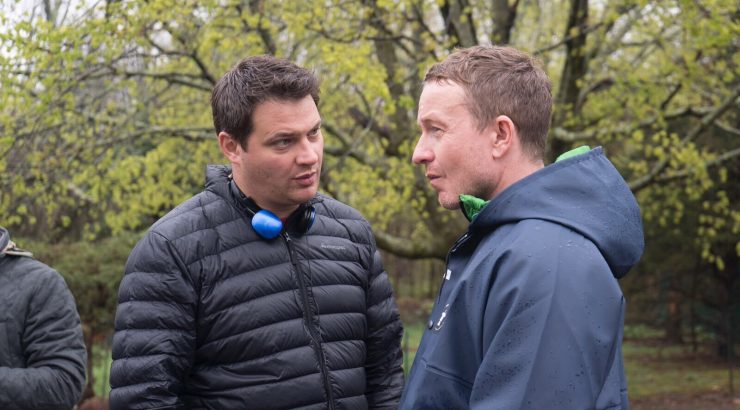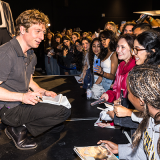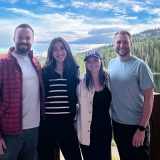
Alumni Spotlight: Michael Pruss (’05) Scott Free EVP, Production
December 11, 2017
Every so often, we’ll be spotlighting alumni and what they are up to these days. These Q&A sessions will give you a bit of insight into where the world has taken them since graduation.
This week, the spotlight is on Michael Pruss (MFA/FTP ’05) who utilized passion, preparation and perseverance to rise to the ranks of EVP, Production at Scott Free.
DODGE: Share Your Career Path With Us – How Did You Get Where You Are Now?
MICHAEL: In my final semester at Chapman – in early 2005 – I interned at DreamWorks, Steve Spielberg’s company. In order to complete my MFA Program, it was required that we undertook some professional experience before graduation. I was very lucky to get a position at DreamWorks and I looked at it as a real opportunity, although most of my work consisted of making tea and coffee and photocopying vast amounts of scripts (the days before iPads!). I quickly learned that if you do these small jobs well – and with a smile on your face – then bigger opportunities present themselves. At the end of my internship in the summer of 2005, an entry-level position opened and I was offered a job in the Story Department (which is basically the administrative hub of the studio). I worked for DreamWorks for a year, and during those 12 months I read every screenplay I could get my hands on and really tried to understand how the Hollywood system works. And, above all, how films actually get made — and why. I also watched literally hundreds of films – at all hours of the day and night! – and asked a million questions to anyone who would give me the time of day.
After DreamWorks, I got a job working at Paramount Pictures as an assistant in Production & Development before joining Focus Features as a Creative Executive in 2007. Getting a job at Focus was a big moment for me, as I loved the company’s films so much and the jump between assistant work and an executive role can be very tough to make. Thankfully I had a lot of support by then – like any job, you build relationships the more time you spend in the business – and I lobbied a couple of high-level producers and executives to put in a nice word for me!
While at Focus, I worked on films such as Gus Van Sant’s Academy-Award winning Milk starring Sean Penn, The American, starring George Clooney, and the animated feature Coraline from Henry Selick. I joined Indian Paintbrush as VP, Production, in November 2010, and oversaw the acquisition of Drake Doremus’s Grand Jury Prize winning film Like Crazy (starring Felcity Jones and the late Anton Yelchin) at the Sundance Film Festival, 2011. I also co-produced the director’s follow-up film Breathe In, starring Guy Pearce and Felicity Jones.

Michael (center) with Kristen Stewart and Nicholas Hoult at the Venice Film Festival World Premiere of EQUALS (September 2015).
Since joining Scott Free in 2013, I produced Equals – that had its World Premiere in Competition at the 2015 Venice Film (and was picked up by A24 for distribution) – starring Kristen Stewart and Nic Hoult, and also produced Kristen’s short-film directorial debut, Come Swim, that screened at Sundance and Cannes 2017. I recently produced Newness, my 4th collaboration with Drake Doremus, that also had its World Premiere at Sundance 2017 and was subsequently acquired by Netflix. I just finished production on Zoe (starring Ewan McGregor and Lea Seydoux) and Jake Scott’s The Burning Woman that stars Sienna Miller, Christina Hendricks and Aaron Paul. Next year I am working with my boss Ridley Scott on Cascade – a film that he hopes to direct in the summer – as well as Wash Westmoreland on The Earthquake Bird.
DODGE: Did you face any challenges in your transition from being a student at dodge to entering the professional world?
MICHAEL: I think when you are a student – especially a film student – you are wrapped up in this lovely insulated bubble of creativity and possibility (especially at a wonderful place like Chapman). This might sound like I am stating the obvious, but the reality of working in the film business – whatever path you end up taking – is a lot harder and harsher than a supportive university environment. The competition is intense – you have to consistently be at the top of your game and have a thick skin as there’s definitely a lot of rejection. But if you want it badly enough and are that passionate about filmmaking and storytelling, then I think inherently you will have that desire to succeed. The other piece of advice I can give is: build relationships in the industry early. Internships are an excellent way to do this (see above), as is getting to know visiting speakers and guests who are industry professionals. Obviously, there’s a line between fostering a relationship and being opportunistic, but this is definitely a business of getting to know people. All of this will pay dividends when you are looking for your first job: don’t be shy to ask someone if they could spare 15 minutes for a coffee or have a brief phone call to share some advice or experience.
DODGE: What have you taken from the classroom and applied to your career?
MICHAEL: All sorts of things. For instance, I am thankful that I got to produce a few short films while I was at Chapman. Consequently, you learn your way around a film set – what the multitude of jobs are and what everyone does – which is invaluable knowledge that can only be gained by actually “doing it”. I also took a class in cinematography which means I don’t look completely blank when a DP is talking about lenses and lighting set-ups! Also, every writer and/or director you work with has his or her cultural and filmic reference points and I’ve often found myself referring back to some of the film history classes I took at Chapman and being very happy that I did so!
DODGE: What skills do you believe have been essential to your profession?
MICHAEL: I think, as a producer, you must have a vision — know what kind of movies you want to make and why you want to make them. Be passionate. Have a niche and own it. I’ve always had an affinity for director-driven projects – films that aren’t made purely for the purpose of mass entertainment (although I do enjoy those films as well). That proclivity has been a major factor with respect to the companies I have worked for (Paramount Vantage, Focus etc.) and every film I have worked on to date. Also, being good with people really helps as filmmaking is such a collaborative medium. Finally – have a good attitude! It really does go a long way.
DODGE: What is the best advice you have received and/or what advice would you give current students?
MICHAEL: Someone once said to me it’s all about the three ‘Ps’ – passion, preparation, perseverance. Good advice for the film business – and life!
Thanks so much for sharing, Michael!

